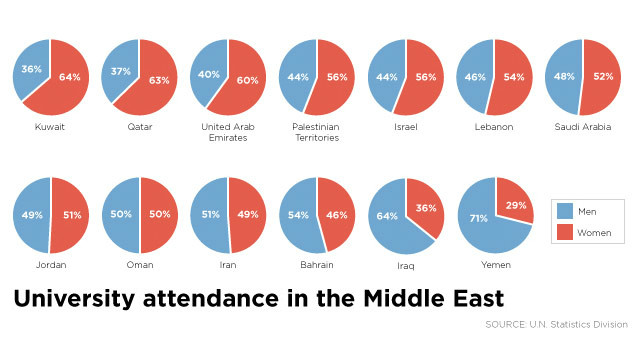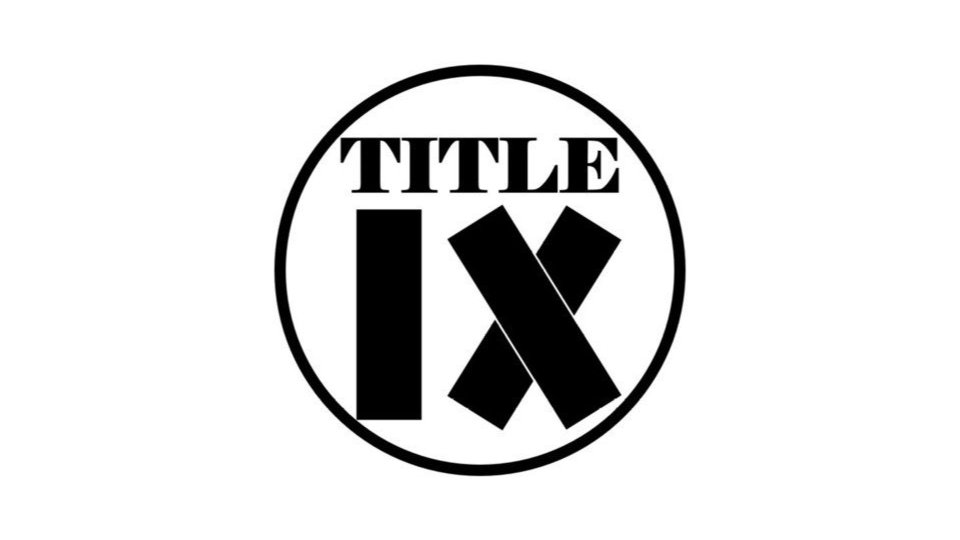In the West we are constantly bombarded with the message that Middle-Eastern women are oppressed beneath the merciless jackboot of patriarchal oppression. They are shuttered from public life, marginalized from education, generally looked upon as inferior, and are physically abused at every opportunity. We are often told this is especially the case in areas where religious extremism – such as Islam – gains a foothold.
Websites like this one have pointed out that, contrary to the “more victim than thou” narrative of Feminists, reality is not as one-sided as we are led to believe. Indeed, not only are women not marginalized from educational institutions in the Middle-East, they are in fact better educated than most Middle-Eastern men. And this trend is set to continue indefinitely.
Here’s a set of charts based on U.N. statistics:

And as this CNN article by Catriona Davies tells us:
In nearly two thirds of Middle Eastern countries, there are more women than men in university, according to United Nations statistics. ‘This is a giant step towards – and in many cases beyond – one of the United Nation’s Millennium Development Goals: to eliminate gender disparity in all levels of education by 2015.’
Davies is correct: it is not just a big step toward equality. It is a big step beyond equality. One might wonder: now that women outnumber men in two thirds of Middle-Eastern universities, what is the UN’s plan to help foster and ensure educational equity for men and boys?
Don’t worry, though; there are always rationalizations at hand. The article continues:
While most women’s rights campaigners welcome the progress in education, many are concerned it does not translate into greater equality in the workplace. ‘The gender gap has been closed in education in many Arab countries, which is a big achievement of recent years,’ said Dima Dabbous-Sensenig, Director of the Institute for Women’s Studies in the Arab World at the Lebanese American University.
‘It’s very recent,’ she added. ‘Even in the 1990s there was a big gender gap in education. However, there’s a paradox that we have a lot of women getting a higher education and they are still too absent from the workforce and politics.’
This – the overrepresentation of men at the top (and the blindness to the men at the bottom) – is the “go-to” argument among Feminists to dismiss concerns regarding boys’ education. In the West it is almost always presented side-by-side with citations of the mythical gender wage gap.
And by women being “absent from the workforce,” this Feminist is of course only referring to positions held by men which reflect prestige and power. She is not referring to those men who toil in a field for sixty hours a week in direct sunlight, or who bleed their guts out on a battlefield. She is only referring to men at the top of society, not men at the bottom. As she says:
I believe that things will change gradually. The more women are highly educated, some of them will become motivated, independent young women who will get good jobs. Thirty years ago they didn’t have that option.
Yes, just good jobs. Not both good and bad jobs where men are overrepresented. As we should know by now, Feminism is not about equality. It’s just about more goodies for women.
But why are men dropping out (or not enrolling at all) in higher education in the Middle East? Catriona Davies, the author of the CNN article, says that for some, “university is a luxury unavailable to men who are expected to become breadwinners.”
And that is also what we are seeing here in the United States, particularly among low-income minority men. They don’t have the money of middle-class families to work part-time (or not at all) while simultaneously attending a university, and unlike women they generally can’t rely on other people to provide for them.
They are also – like Middle-Eastern men – expected by both men and women to provide for women to have any kind of social status or dating opportunities at all. And while many women have ramped up their demand for liberation from traditional gender norms, fewer of them are enthusiastic about men being liberated when it comes to areas where women stand to lose something (i.e., the male provider role).
Apparently CNN only interviewed Feminists for the entirety of this piece, even though this issue affects both men and women. The article continues:
Nawar Al-Hassan Golley, Associate Professor in Literary Theory and Women’s Studies at the American University of Sharjah, in the United Arab Emirates, said both the high percentage of women in university and their absence from the workforce can be explained in the social upbringing of girls.
‘Girls and boys continue to be socialized very differently with different expectations. Boys have more personal freedoms to go outside the home, whereas girls continue to be socialized within the home.’
But it’s not just that boys have more freedom to go outside the home. That’s like telling a field slave that he is “more liberated” because he “has more freedom” to work in the field while pretending as though he has any other option.
No, it’s not just that men have traditionally “had more freedom” to go outside the home, but instead that – unlike women – they are required to. Unlike women, they are generally not allowed to stay in the home and be stay-at-home parents. They are required to go out and earn money, regardless as to whatever level of education they possess (the phrase bricks without straw comes to mind).
And yes, as I hope you noted, Middle-Eastern countries have their Feminist professors and Women’s Studies departments as well. Nawar Al-Hassan Golley has other suggestions for why men are increasingly underrepresented in higher education in the Middle East:
For boys there are more temptations as they can get jobs such as in the military or police that are well paid without having to go through an academically challenging degree.
Well-paid, certainly. And also far more dangerous.
The women who graduate from a university will go on to work in carpeted, air-conditioned environments, if they work at all. The men, by contrast, will continue to work because they have to. And so long as Feminism dominates the discourse on gender equity, the men at the bottom of society – who work the most brutal, filthy, and deadly jobs – will suffer and die invisibly.
Why? Because they are men.
Thank You for Reading
If you like what you have read, feel free to sign up for our newsletter here:
About the Author
Related Posts
In the West we are constantly bombarded with the message that Middle-Eastern women are oppressed beneath the merciless jackboot of patriarchal oppression. They are shuttered from public life, marginalized from education, generally looked upon as inferior, and are physically abused at every opportunity. We are often told this is especially the case in areas where religious extremism – such as Islam – gains a foothold.
Websites like this one have pointed out that, contrary to the “more victim than thou” narrative of Feminists, reality is not as one-sided as we are led to believe. Indeed, not only are women not marginalized from educational institutions in the Middle-East, they are in fact better educated than most Middle-Eastern men. And this trend is set to continue indefinitely.
Here’s a set of charts based on U.N. statistics:

And as this CNN article by Catriona Davies tells us:
In nearly two thirds of Middle Eastern countries, there are more women than men in university, according to United Nations statistics. ‘This is a giant step towards – and in many cases beyond – one of the United Nation’s Millennium Development Goals: to eliminate gender disparity in all levels of education by 2015.’
Davies is correct: it is not just a big step toward equality. It is a big step beyond equality. One might wonder: now that women outnumber men in two thirds of Middle-Eastern universities, what is the UN’s plan to help foster and ensure educational equity for men and boys?
Don’t worry, though; there are always rationalizations at hand. The article continues:
While most women’s rights campaigners welcome the progress in education, many are concerned it does not translate into greater equality in the workplace. ‘The gender gap has been closed in education in many Arab countries, which is a big achievement of recent years,’ said Dima Dabbous-Sensenig, Director of the Institute for Women’s Studies in the Arab World at the Lebanese American University.
‘It’s very recent,’ she added. ‘Even in the 1990s there was a big gender gap in education. However, there’s a paradox that we have a lot of women getting a higher education and they are still too absent from the workforce and politics.’
This – the overrepresentation of men at the top (and the blindness to the men at the bottom) – is the “go-to” argument among Feminists to dismiss concerns regarding boys’ education. In the West it is almost always presented side-by-side with citations of the mythical gender wage gap.
And by women being “absent from the workforce,” this Feminist is of course only referring to positions held by men which reflect prestige and power. She is not referring to those men who toil in a field for sixty hours a week in direct sunlight, or who bleed their guts out on a battlefield. She is only referring to men at the top of society, not men at the bottom. As she says:
I believe that things will change gradually. The more women are highly educated, some of them will become motivated, independent young women who will get good jobs. Thirty years ago they didn’t have that option.
Yes, just good jobs. Not both good and bad jobs where men are overrepresented. As we should know by now, Feminism is not about equality. It’s just about more goodies for women.
But why are men dropping out (or not enrolling at all) in higher education in the Middle East? Catriona Davies, the author of the CNN article, says that for some, “university is a luxury unavailable to men who are expected to become breadwinners.”
And that is also what we are seeing here in the United States, particularly among low-income minority men. They don’t have the money of middle-class families to work part-time (or not at all) while simultaneously attending a university, and unlike women they generally can’t rely on other people to provide for them.
They are also – like Middle-Eastern men – expected by both men and women to provide for women to have any kind of social status or dating opportunities at all. And while many women have ramped up their demand for liberation from traditional gender norms, fewer of them are enthusiastic about men being liberated when it comes to areas where women stand to lose something (i.e., the male provider role).
Apparently CNN only interviewed Feminists for the entirety of this piece, even though this issue affects both men and women. The article continues:
Nawar Al-Hassan Golley, Associate Professor in Literary Theory and Women’s Studies at the American University of Sharjah, in the United Arab Emirates, said both the high percentage of women in university and their absence from the workforce can be explained in the social upbringing of girls.
‘Girls and boys continue to be socialized very differently with different expectations. Boys have more personal freedoms to go outside the home, whereas girls continue to be socialized within the home.’
But it’s not just that boys have more freedom to go outside the home. That’s like telling a field slave that he is “more liberated” because he “has more freedom” to work in the field while pretending as though he has any other option.
No, it’s not just that men have traditionally “had more freedom” to go outside the home, but instead that – unlike women – they are required to. Unlike women, they are generally not allowed to stay in the home and be stay-at-home parents. They are required to go out and earn money, regardless as to whatever level of education they possess (the phrase bricks without straw comes to mind).
And yes, as I hope you noted, Middle-Eastern countries have their Feminist professors and Women’s Studies departments as well. Nawar Al-Hassan Golley has other suggestions for why men are increasingly underrepresented in higher education in the Middle East:
For boys there are more temptations as they can get jobs such as in the military or police that are well paid without having to go through an academically challenging degree.
Well-paid, certainly. And also far more dangerous.
The women who graduate from a university will go on to work in carpeted, air-conditioned environments, if they work at all. The men, by contrast, will continue to work because they have to. And so long as Feminism dominates the discourse on gender equity, the men at the bottom of society – who work the most brutal, filthy, and deadly jobs – will suffer and die invisibly.
Why? Because they are men.
Thank You for Reading
If you like what you have read, feel free to sign up for our newsletter here:
About the Author
Related Posts
More from Title IX for All
Accused Students Database
Research due process and similar lawsuits by students accused of Title IX violations (sexual assault, harassment, dating violence, stalking, etc.) in higher education.
OCR Resolutions Database
Research resolved Title IX investigations of K-12 and postsecondary institutions by the Department of Education’s Office for Civil Rights (OCR).
Attorneys Directory
A basic directory for looking up Title IX attorneys, most of whom have represented parties in litigation by accused students.






